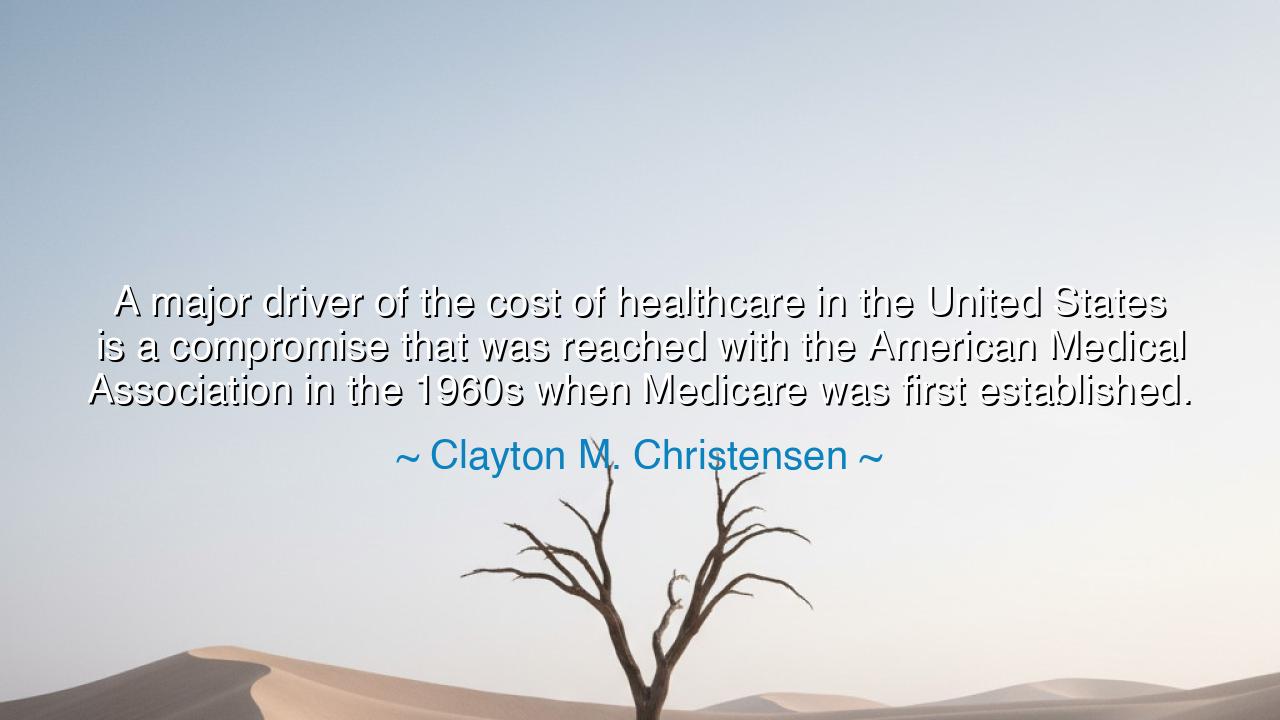
A major driver of the cost of healthcare in the United States is
A major driver of the cost of healthcare in the United States is a compromise that was reached with the American Medical Association in the 1960s when Medicare was first established.






Hear, O children of understanding, the words of Clayton M. Christensen, who declared with sober wisdom: “A major driver of the cost of healthcare in the United States is a compromise that was reached with the American Medical Association in the 1960s when Medicare was first established.” In these words lies not only the memory of a political bargain, but the unveiling of a truth: that the choices of yesterday, though made in urgency and with intent to heal, may cast long shadows upon the generations to come. For compromise is a double-edged sword—sometimes it grants peace, but sometimes it plants seeds of burden that later grow into towering difficulties.
The meaning of Christensen’s words is profound. When Medicare was born in the 1960s, it was a moment of triumph, for the elderly of America, long abandoned to poverty and illness, were promised care. Yet in forging this system, leaders struck a compromise with the American Medical Association, the guild of physicians, granting them protection of their influence and preserving the costly fee-for-service model. This compromise, though it secured the cooperation of doctors and launched the program, also entrenched inefficiencies and inflated costs. Thus, what was once a victory for access became, over decades, a source of crushing expense.
Consider, my children, the tale of Rome after the Punic Wars. When Rome defeated Carthage, its leaders, seeking peace among their allies, struck compromises with powerful nobles and landowners. In doing so, they preserved unity, but they also sowed inequality and corruption that grew with time. What seemed a triumph of diplomacy became, in the centuries ahead, a driver of Rome’s decline. So too in America: the compromises of the 1960s gave immediate progress, but their hidden costs weigh heavily upon the people today.
The origin of Christensen’s teaching comes from his lifelong study of innovation and systems. He saw that industries are shaped less by isolated acts than by the structures and agreements that define their foundation. Thus, when he looked at healthcare, he traced not only its present flaws, but its birth. He revealed that the high cost of American care is not a sudden accident but the natural fruit of decisions made in the beginning—decisions wrapped in the politics of power and the necessity of compromise.
Let us not mistake his words as condemnation of Medicare itself. No—the program lifted millions of elders from suffering and became a pillar of security. Yet he warns us that even noble efforts, if built on flawed agreements, can carry burdens forward. It is not the intention that matters alone, but the design. And when design favors entrenched interests over efficiency, the result is a system that strains under its own weight. This is not a failure of compassion, but a failure of foresight.
The lesson is luminous: when crafting the foundations of great systems, let wisdom, not expedience, guide the hand. For what is written into law and structure in one generation becomes the inheritance of the next. Short-term victories may conceal long-term struggles. Thus leaders must ask not only, “Will this work now?” but also, “What future does this create?” For compromises made in haste may become chains for our children.
Practical actions lie before us: if we seek to reform healthcare, we must look with clear eyes at the roots, not only the branches. Study the structures, question the compromises, and dare to rebuild where inefficiency reigns. In our own lives, too, let us remember: every choice is a seed, and every agreement a foundation. Strive always to plant wisely, to compromise not for convenience but for justice, and to think not only of today but of tomorrow.
Thus, O heirs of tomorrow, let Christensen’s words echo in your hearts. The cost of care is not fate, but the fruit of choices once made. Learn from the past, and build for the future with greater foresight. For only by crafting systems rooted in fairness, efficiency, and vision can a nation truly honor its people and secure their well-being for generations to come. Choose your compromises carefully, for they shape the destiny of nations.






AAdministratorAdministrator
Welcome, honored guests. Please leave a comment, we will respond soon